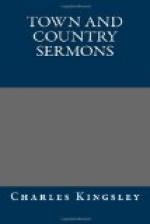My friends, I speak sober earnest. God grant that our old heathen forefathers may not rise up against us in the day of judgment, and condemn us. Let us turn to the Lord this day with all our hearts, and come to this holy table, confessing all our sins and unfaithfulness, and backslidings, that we may get there cleansing from his most precious blood, strength from his most precious body, life from his life, and spirit from his spirit; that so we may go away to lead new lives, following the commandments of God, and living up to our great light and knowledge, at least as well as our forefathers lived up to their little light. And so we shall really keep the feast of Epiphany in spirit and in truth: for Epiphany means the shewing of Jesus Christ to us Gentiles; and the way to prove that Jesus Christ has been shewn to us, and that we have seen his glory, the glory as of the only-begotten of the Father, full of grace and truth, is to keep his commandments, and live lives like his.
SERMON XXXIX. THE WRATH OF LOVE
Psalm cvii. 6. Then they cried unto the Lord in their trouble, and he delivered them out of their distresses.
If I were asked to give a reason why I believed the Old Testament to be an inspired and divine book, as well as the New, I could not do better, I think, than to lay my hand on this 107th psalm, and say,— This is my reason for believing the Old Testament to be inspired. I have hundreds of others: but this one is enough—this one psalm. It contains an account of God’s dealings with men, such as the world never heard before, and very seldom since, save from a very few men, who really saw what the Bible meant, and honestly followed its teaching. It gives a notion of the justice of God, and an explanation of the chances and changes of this mortal life, such as you will find nowhere else save in the Bible, and in the books of Christian men who have been taught by the Bible. The man who wrote that psalm knew so much more than other men, that he must have been indeed inspired by the Spirit of Truth, and the Holy Ghost of God.
And, I should say, I have come to this opinion mainly by comparing this psalm with the writings of heathens, even the wisest and the best of them. For the heathens, like all men, used to have their troubles, and to ask themselves, Who has sent this trouble? And why has he sent it? And their answers remain to us in their writings, some worse, some better, some very foolish, some tolerably wise. But when one compares the heathen writings with this psalm, or with any psalms or passages of the Old Testament which talk of God’s dealings with man, then we shall be altogether astonished at the superiority of the Bible. The Bible will seem to us quite infinitely wiser than heathen books, on this matter, as on others— so much more simple, and yet so much more deep; so much more rational also, and so much more true: agreeing so much more with the facts which we see happen round us: agreeing so much more with our own reason, experience, inward conscience, about what is just and unjust:—that we shall begin to see as much difference between heathen books and the Old Testament, as there is between the dim dawn of morning, and the full blaze of noonday light.




